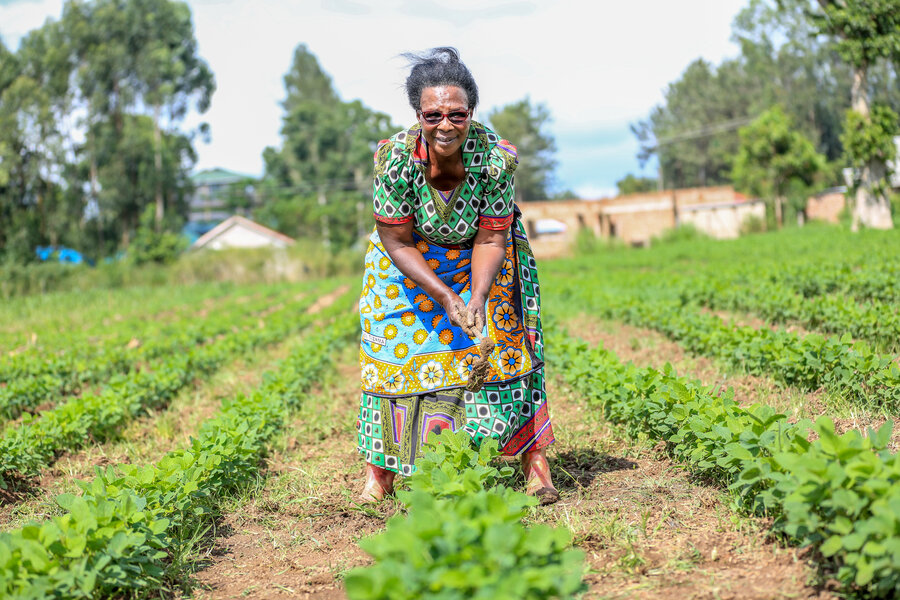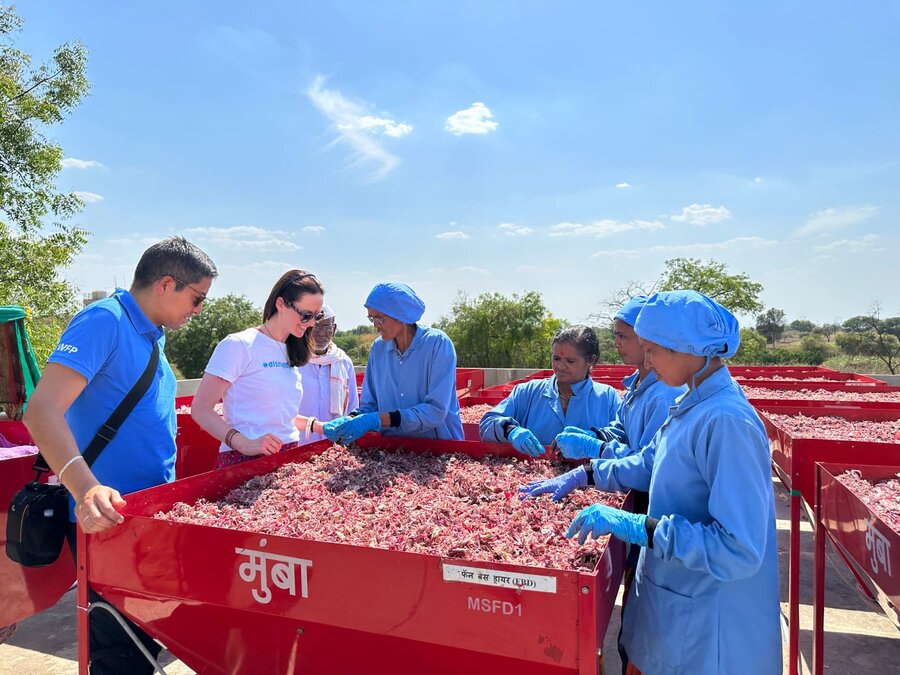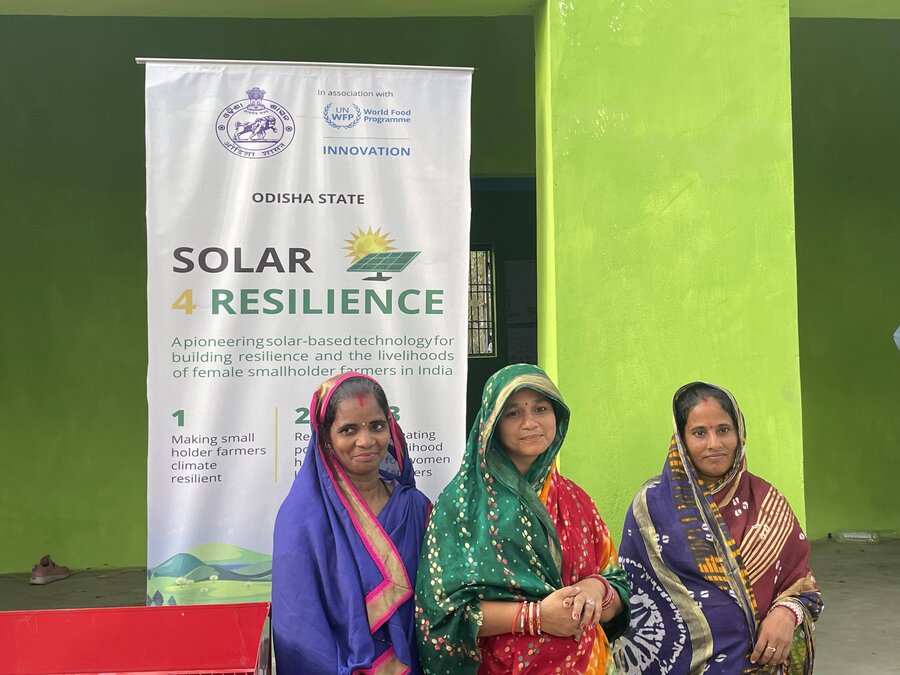Meet the two WFP-backed Earthshot prize winners
When Hannah Karanja was a young girl, she remembers her mother’s farm flourishing year after year, thanks to staple crops such as maize and saga, a local type of soybean, grown without the use of fertilizers.
Now, under more difficult conditions in the western Kenyan region of Nambale, she’s seeing her own fields flourish.
This is thanks to switching to sustainable farming practices and joining a new scheme rolled out by carbon-credit startup Boomitra, and an international agricultural alliance.
(Boomitra will help Hannah earn extra income for the carbon sequestered on her farm due to her smart agricultural practices by selling those carbon credits to companies seeking to offset emissions.)
A continent away in India, another smallholder farmer, Chayya Kundlik Raosurse, is reaping the benefits of another cutting-edge scheme: solar-powered dryers supplied by another development startup, S4S Technologies (S4S). These machines process her perishable produce, prolonging their shelf and market life.

The two farmers are benefiting from green innovations that are now getting global recognition. For Boomitra and S4S are winners in the third annual Earthshot Prize announced in Singapore today (7 November), winning in the ‘Fix Our Climate’ and ‘Build a waste-free world’ categories respectively.
Launched by Britain’s Prince William in 2020, Earthshot awards US$1.2 million to five winners developing solutions to environmental problems. Finalists get to enter a Fellowship programme giving them the mentorship and technical support they need to scale up their projects.
Both Boomitra and S4S Technologies are supported by the World Food Programme (WFP) Innovation Accelerator, which aims to support high-impact innovations to help end hunger.
With its vast global network, Innovation Accelerator can foster new partnerships among companies, governments and nongovernmental groups, attracting financial support for innovations to increase their scale and impact.

Through their groundbreaking innovations, Boomitra and S4S are helping farmers and entire communities build resilience to climate change, which is delivering a devastating blow to some of the poorest communities in low-income countries. Below we look at how.
Kenya: Healthy soils tackle climate-related effects
Farmer Hannah Karanja's seen the fallout of extreme weather firsthand. Kenya emerged, this year, from one of its worst droughts on record only to be hit by heavy rains and flash floods, which displaced households and damaged critical infrastructure such as roads and bridges.
“In my childhood the weather patterns were steady, the rains came at specific times, and so our parents knew when to plant and when to harvest,” says Hannah. “But now the climate is very unstable. If you do not take the right measures, you will not have a good harvest.”

Four years ago, in a bid to keep her farm sustainable and profitable, Hannah began farming using regenerative methods aimed at building healthy soil that is more resistant to drought, heat and other climate impacts.
Reaping by hand instead of ploughing, for example, results in healthier soil that is not disturbed so much.
By rotating the types of crops she plants, she ensures no single variety drains her fields of critical nutrients.
In 2022, Hannah joined an effort by Boomitra and the Farm to Market Alliance (a farmer-focused public-private consortium) to pilot a carbon-credit system in Kenya.
WFP connected the two groups to scale up Boomitra’s innovation, which uses satellite and AI technology to help monitor, report, and verify carbon removal credits.
Farmers such as Hannah are paid for the carbon they remove from the atmosphere through healthy soil practices.
Changing the way she farms has doubled Hannah’s yields and seen her revenues soar, allowing her to pay for her children's schooling and other expenses. She will soon receive additional revenue from the carbon-credit scheme.
“It’s from this farm that even my last child went to the university, graduated and is now a lawyer,” she says. “My second-last child is an engineer and now I even teach my grandchildren this method of farming.”
India: Empowering women farmers
In India, 70 percent of rural households depend on agriculture to make a living. Collaborating with local authorities, banks, and nongovernmental groups, with WFP support S4S provided micro-loans to female smallholder farmers in western Maharashtra state, enabling them to buy solar-powered dryers and food processing equipment.
“In the last decade, extreme heat affected the quality of our produce,” farmer Chayya says, referring to irregular weather linked to climate change that is only expected to intensify. “With S4S, we process harvests that would otherwise go to waste.”
So far, the project has reached 2,000 women farmers in the region, allowing them to better preserve, transform and earn more revenue from harvests. By empowering micro-entrepreneurs like Chayya, the project – now being rolled out in another Indian state – also empowers them.
“Through the work of S4S in Maharashtra state, we realized the critical importance of collaborating with all stakeholders and WFP to build meaningful relationships,” says S4S co-founder Nidhi Pant, adding such relationships “enhance our efficiency by pooling skills, knowledge, and resources.”
Bernhard Kowatsch, head of the WFP’s Innovative Accelerator, believes S4S's most exciting feature is its potential to scale up, with “private investments for this social business working hand-in-hand with local governments in India and women entrepreneurs.”
“We have the potential to reach millions more smallholder farmers,” he says.
Do you have a game-changing idea to tackle climate change, address hunger or build more sustainable food systems? Apply to the WFP Innovation Accelerator Innovation Challenge to receive up to US$100,000 in equity-free funding, world-class mentors, and access to WFP’s global network of partners field operations


